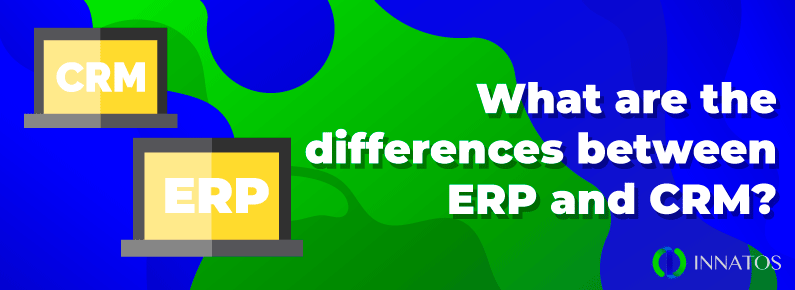What are the differences between ERP and CRM?
Often, clients ask about ERP and CRM, doubting the functionalities of each one, without knowing very well their difference. Therefore, they have doubts about which software interests them the most for their business. What are the differences between ERP and CRM? We will try to explain the differences between both, management software and clarifying concepts.
What does ERP and CRM mean?
ERP and CRM represent different concepts and software, but they are included together in the term of business management. ERP refers to Enterprise Resource Planning (Enterprise Resources Planning). On the other hand, CRM refers to the management of relations with customers (Customer Relationship Management). But what does this mean? Keep reading to learn more and find out.
Both the implementation of an ERP and that of a CRM seeks to adapt the company to digital transformation. They aim to improve productivity, control, and efficiency, but its fields of action are different.
ERP software
An ERP (Enterprise Resources Planning) is a software for internal use and procedures that do not directly affect the relationship with customers. The ERP works in the exchange of information between departments and the control of the same. In addition, it helps to reduce production costs, with the control of the stock and storage, and with the supervision of the sales. This software is not used for the management of sales, but, for example, in seeing which products are the best sellers. It also provides an invoice control and an accounting or payroll administration.
In other words, the ERP software controls a large part of the internal processes of a company, for example. It gives the production department inputs on the best-selling products and at the same time, aids in sharing information with the financial department on costs, benefits and other details. What are the differences between ERP and CRM? In short, an ERP, which is usually a modular tool, acts on the following dimensions of a company:
- Production
- Payroll
- Sale control
- Stock control
- Accounting and Finance
- Supply and suppliers
The final objective of the ERP software is to centralize the integral management of a company is a tool, looking for better interdepartmental communication and better access to data.
Now, an ERP is a complex software that requires complex actions and decisions. By joining so many departments, hiring is usually expensive. When performed many times to maintenance is also expensive. By bringing together so much information, learning and training is usually long and complex. When joining so many parts, the same happens with the setup of the software, requiring time, effort and money.
ERP’s functions
An ERP is usually a software that is installed in medium and large-sized companies. The reason is that we are talking about an important investment in both economic, time and personal aspects. At the same time, not all companies manage stock or manufacture products. For example, agencies, consultants and other professional services companies, and these essential modules when taking advantage of an ERP.
There are many questions that a company has to ask before undertaking the implementation of this draft. For that reason, not all companies, whether by size or nature, need it. However, both ERP and CRM are tools that usually have a positive impact on a company. An ERP, given its great breadth, can contribute great things to a company’s balance sheet.
CRM software
The CRM (Customer Relationship Management) is a software that exists to create objectives and raise strategy. Once the ERP’s results are reviewed, it’s the turn to work with the CRM. This software is a tool that does affect the relationship with customers and external processes. The purpose of the CRM is to organize the information of the client. It places it in the center of the company. Then, it helps in the management or commercial follow-up. Thanks to CRM software, a company is able to draw up both sales and marketing strategies.
What are the differences between ERP and CRM? Unlike the ERP, CRM software contains customer information, making it a more dynamic and agile tool both in use and implementation, learning, functionality, and price. CRM refers to a business model that seeks to identify the most valuable leads for the company. In addition, it helps in managing their relationships in an efficient and decisive way in order to achieve not only the sale but loyalty.
CRM’s functions
The main functions of CRM software and what can be expected from it are:
- The automation of sales processes, from the leads generated, the registration of the leads, the follow-up of the same, alert system or task management.
- Store and activate customer information such as emails, posts, interactions with the company, meetings, source of attribution and others.
- Creation of segments for different marketing or sales objectives, such as strategy planning, communications segmentation, sales forecasting and more.
- Commercial monitoring and creation of processes in it.
The implementation of a CRM is essential to carry out a refined and successful marketing. Promotion or communication actions should be segmented as much as possible to increase conversion rates and minimize costs both by lead and by customer. Needless to say, CRM is also key to the proper performance of the commercial department of any company.
In short words, CRM is a client-centered software whose purpose is to improve relationships with the company (both before and after-sales) and increase sales. Unlike ERP, CRM is useful in all types of companies.
Can companies work with ERP and CRM at the same time?
It will depend on the nature of each company and the suitability of implementing two tools with such depth in it. In fact, traditional ERP implementations used to incorporate a CRM module. However, ERP developers usually have an external and independent CRM since it is advisable to have software dedicated especially to the commercial task.
In conclusion and that being said, ERP and CRM are fully compatible. They are different and have to be measured by different scales, but their work in a company is complementary. Both tools are designed to make the most of the resources of the company. If you want to find the perfect ERP or CRM software for your company, in Innatos System Group we have what you need. We can also develop custom made software designed to match the requirements of any business.



Leave a Reply
Want to join the discussion?Feel free to contribute!